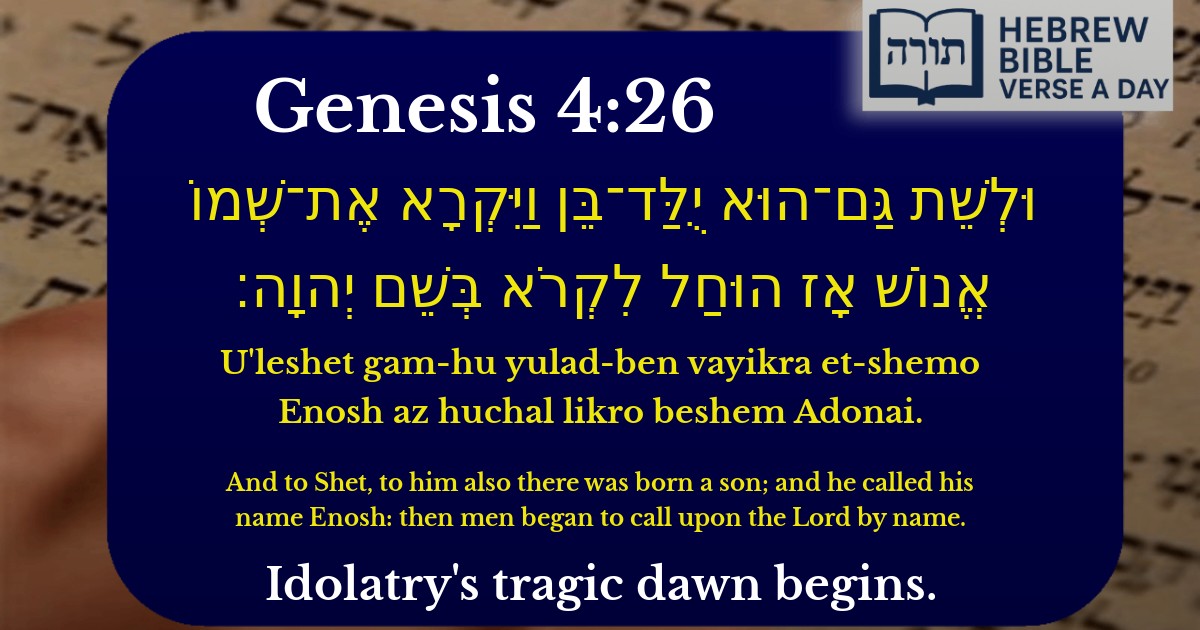Frequently Asked Questions
Q: What does 'then men began to call upon the Lord by name' mean in Genesis 4:26?
A: Rashi explains that this verse marks the beginning of idol worship in the world. The term 'to call upon the name of the Lord' is understood by our Sages to mean that in the time of Enosh, people started to associate G-d's name with physical objects (like stars and idols), which was the origin of avodah zarah (idol worship).
Q: Why is the birth of Enosh significant in the Torah?
A: The birth of Enosh, son of Shet (Seth), is significant because it continues the lineage that would eventually lead to Avraham and the Jewish people. However, as Ramban notes, this verse also introduces a spiritual decline, as it was during Enosh's time that people began to misuse G-d's name, leading to corruption that would later bring about the Flood.
Q: How does Genesis 4:26 relate to prayer?
A: While the simple meaning suggests people began to pray to G-d, our Sages (as brought by Rashi) interpret this negatively as the start of idolatry. However, the Midrash (Bereishit Rabbah) also notes that there were righteous individuals like Metushelach (Methuselah) who continued to serve Hashem properly. This teaches us the importance of maintaining pure devotion to G-d even when others stray.
Q: What lesson can we learn from Genesis 4:26 today?
A: This verse teaches us the danger of distorting true service of G-d. As the Rambam explains in Hilchot Avodat Kochavim, the first step toward idolatry was giving honor to intermediaries (like stars) as a way to honor G-d - which led to full-blown idol worship. Today, we must ensure our worship remains direct and pure, without any foreign influences.
Q: Why does the Torah mention that people began calling on G-d's name specifically at Enosh's time?
A: The Talmud (Sanhedrin 38b) and Midrash connect this to the generation of Enosh being the first to give names to idols, showing how quickly humanity strayed after Adam. This serves as a warning about how easily proper worship can become corrupted when people innovate in ways that contradict Torah teachings.


The Birth of Enosh and the Beginning of Divine Worship
The verse states: "וּלְשֵׁת גַּם־הוּא יֻלַּד־בֵּן וַיִּקְרָא אֶת־שְׁמוֹ אֱנוֹשׁ אָז הוּחַל לִקְרֹא בְּשֵׁם יְהוָה" ("And to Shet, to him also there was born a son; and he called his name Enosh: then men began to call upon the Lord by name"). This marks a significant transition in human history regarding the relationship between humanity and Hashem.
Rashi's Explanation
Rashi (Bereshit 4:26) explains that the phrase "הוּחַל לִקְרֹא בְּשֵׁם יְהוָה" ("then men began to call upon the Lord by name") does not indicate proper worship but rather the beginning of idolatry. He derives this from the root "חלל" (which can mean "to profane"), suggesting that people started to ascribe divine names to idols and celestial beings, thereby profaning the true service of Hashem.
Ramban's Counterpoint
Ramban (Bereshit 4:26) disagrees with Rashi, arguing that the verse describes a positive development—the formal establishment of prayer and public worship of Hashem. He notes that Enosh's generation recognized Hashem's sovereignty and began to gather in groups to call out to Him, setting a precedent for organized divine service.
Midrashic Interpretations
The Significance of the Name "Enosh"
The name אֱנוֹשׁ (Enosh) comes from the root אנש, meaning "man" or "mortal." Some commentators (e.g., Malbim) explain that this name reflects the growing awareness of human frailty and dependence on Hashem, which may have inspired both sincere worship and, unfortunately, misguided practices.
Halachic Implications
The Rambam (Hilchot Avodah Zarah 1:1) cites this verse as the origin of idolatry, following Rashi's interpretation. He explains that humanity's mistake was attributing divine power to intermediaries (like stars or angels) rather than directing worship solely to Hashem.